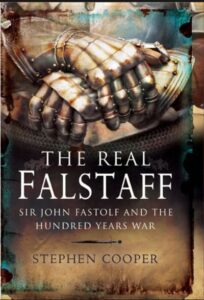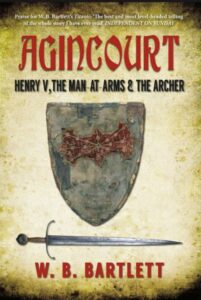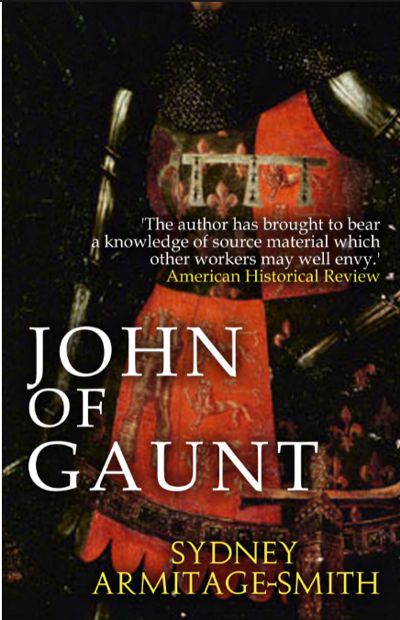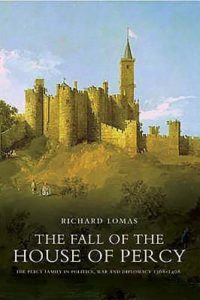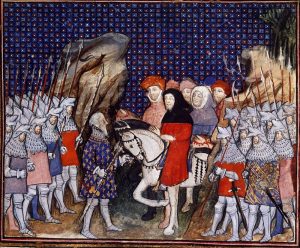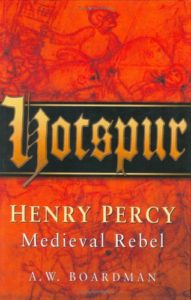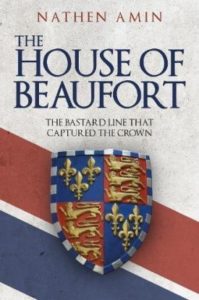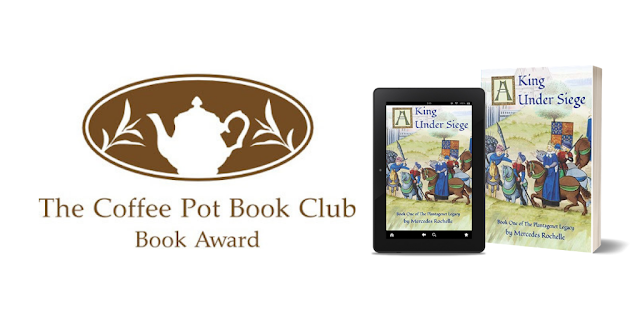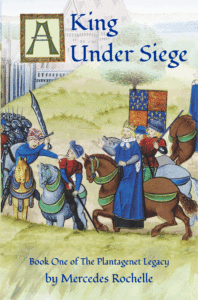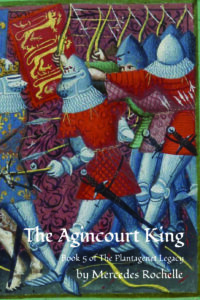 The Agincourt King (The Plantagenet Legacy Book 5) by Mercedes Rochelle is a lavish depiction of one of the most famous battles in English history, which was won by one of England’s most beloved kings.
The Agincourt King (The Plantagenet Legacy Book 5) by Mercedes Rochelle is a lavish depiction of one of the most famous battles in English history, which was won by one of England’s most beloved kings.
Immortalised by Shakespeare, and to some extent, Kenneth Branagh, Henry V is probably one of the more recognised kings of this era. Shakespeare is a hard act to follow, but I was really looking forward to seeing Rochelle’s take on the man famed for his St Crispin’s Day Speech. Rochelle has breathed new life into Henry. He is a capable and somewhat caring king, devoted to the well-being of his people, yet driven by ambition to achieve the same greatness as his great grandfather, Edward III. Edward triumphed in the French battle at Crecy, and Henry was determined to achieve a similar feat, ultimately surpassing Edward’s victory at The Battle of Agincourt.
The level of historical detail in this story is astonishing. Rochelle’s dedication to research is reflected in her authoritative penmanship. The historical background of this story is so impressive, that it practically screams authenticity. There was no question about the time period I was in while reading this book. Rochelle’s skilful writing revives this era in all its agony and splendour.
Beyond being a narrative of conflict, this story explores the complexities of family, emphasizing the bond between brothers. Humphrey, Henry’s youngest brother, admires the king with fierce pride. Humphrey adores his brother but this devotion does not blind Humphrey to Henry’s faults. At times, he finds Henry rather confusing. Although cold-blooded murder bothers Henry, he doesn’t have the same moral dilemma about causing the death of thousands in battle. Witnessing the death of his closest friends and comrades from the bloody flux during the Siege of Harfleur was not a cause for retreat. Humphrey sees that Henry values honour above all else, especially when it comes to defeating the French.
Henry is portrayed as an extraordinarily astute leader, effortlessly navigating the realm of power and politics, and orchestrating the French like a masterful musician. He whistled the melody and the song unfolded just as he desired. He wants to be perceived as a compassionate leader, refraining from aggressive actions against the innocent. However, he has no qualms about causing mass starvation and murdering prisoners of war to achieve his goals. By observing his actions and inactions, the reader, and indeed Humphrey, gain insight into Henry’s true character. He is a driven individual who is hungry for success and recognition. The Battle of Agincourt served as the platform for him to showcase that God was on his side. Once he had done that, he went home. At least for a while.
The way the book explored the relationships between the brothers, particularly Henry and Thomas, was expertly executed. From Humphrey’s musing, he sees greatness in both his elder brothers and comes to the conclusion that both men have the makings for a great king, it is just that fate made Henry the eldest. The portrayal of the brother’s relationships was skilfully done, allowing the reader to truly grasp the dynamics of this family. Henry’s relationship with his brothers was unique compared to previous kings – he cared for them and valued their thoughts, although he had the ultimate authority as king. And as Humphrey notices, although Thomas is the heir to the throne, and looks the part, Henry is the better man for the job. I really enjoyed as a reader getting to know the brothers and the different strengths they had. The way Humphrey told his story from his perspective added a personal touch that I found particularly enjoyable while reading. Humphrey was the ideal narrator for Henry’s story and I really liked him as a character. I thought he was wonderfully depicted.
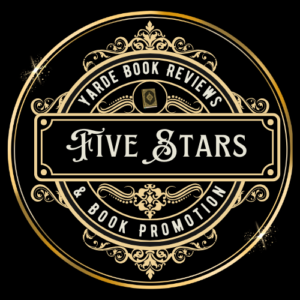
Rochelle does give the reader both the English and French perspectives in this novel. With Charles VI’s unpredictable illness, there is a lack of strong leadership. The depiction of the Dauphin, Louis, Duke of Guienne, was masterfully rendered. In contrast to Henry, he fails to command the loyalty of his nobles, is burdened with rival noble Houses, lacks combat experience, and is surrounded by men he doesn’t trust. Henry cleverly outwits and outmanoeuvres him every time. Nevertheless, the Dauphin was a captivating character to read about and I thoroughly enjoyed witnessing the complete chaos that enveloped him and the French throne.
Rochelle subtly indicated the future by mentioning Henry VI’s disputed lineage – after all, he was an usurper which would have made Henry V the son of an usurper. Henry needed this decisive battle that would validate the Lancastrians’ claim of divine backing. Rochelle illustrates how crucial this war was for Henry’s reign. He needed that success. What happened after in the future generations is, as they say, another story!
I anticipated greatness from this novel because Rochelle can create authentic battle scenes and, at the same time, grasp the complexities of human emotions, and as I anticipated this book is great. It is an utterly brilliant book from start to finish and one I highly recommend.
 It seems that every era in the middle ages has its historian whose exhaustive study puts it in the first rank. We had Edward A. Freeman with the Norman Conquest and James Hamilton Wylie with Henry IV and V. And now we have Jonathan Sumption covering the Hundred Years War in five volumes. I can’t believe I didn’t stumble across him until now! His scholarship is absolutely mind-boggling. He has covered events in such detail that much of the guesswork has been removed. This volume starts at the beginning of Henry IV’s reign and ends at Henry V’s death. We get a substantial look at what was going on in France, which had a huge impact on why and how the English were so successful in France. For instance, when describing the Dauphin Charles (in 1418):
It seems that every era in the middle ages has its historian whose exhaustive study puts it in the first rank. We had Edward A. Freeman with the Norman Conquest and James Hamilton Wylie with Henry IV and V. And now we have Jonathan Sumption covering the Hundred Years War in five volumes. I can’t believe I didn’t stumble across him until now! His scholarship is absolutely mind-boggling. He has covered events in such detail that much of the guesswork has been removed. This volume starts at the beginning of Henry IV’s reign and ends at Henry V’s death. We get a substantial look at what was going on in France, which had a huge impact on why and how the English were so successful in France. For instance, when describing the Dauphin Charles (in 1418):

